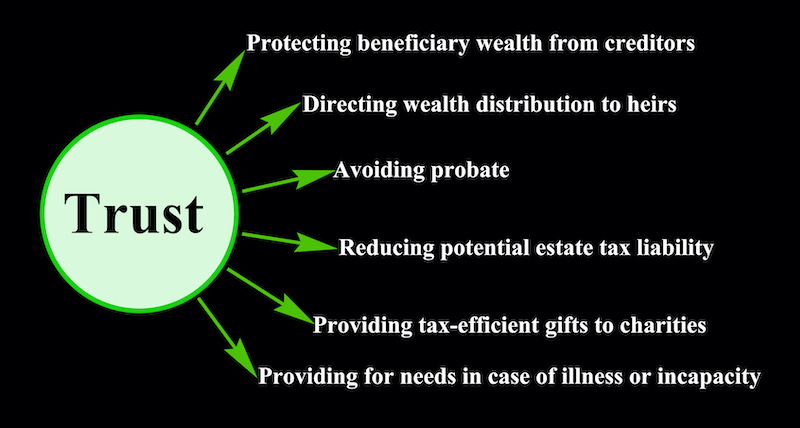 There are many reasons people don’t want their estates going to probate and lots of ways to avoid it. One reason they prefer to avoid it is because probate incurs additional expenses and can tie up an estate for months or more. Though some states and localities have streamlined the process (primarily for less expensive properties), probate often still requires extra work and costs on the family’s behalf. What’s more, probate records remain public. So anyone can view them. This blog explains how to avoid probate.
There are many reasons people don’t want their estates going to probate and lots of ways to avoid it. One reason they prefer to avoid it is because probate incurs additional expenses and can tie up an estate for months or more. Though some states and localities have streamlined the process (primarily for less expensive properties), probate often still requires extra work and costs on the family’s behalf. What’s more, probate records remain public. So anyone can view them. This blog explains how to avoid probate.
Hence, avoid probate by focusing on major estate planning goals. To structure the estate, pass down your wealth passes to your loved ones. It must go through the court system. Make sure to plan so that, after your death, you pass your estate to the rightful owners without delays or additional expense.
How to Avoid Probate
Life Insurance to Avoid Probate
 Distribute life insurance annuities and benefits to beneficiaries named by contract. The insurance policy pays the benefits once they’ve received a copy of the death certificate and several other documents. Designate a beneficiary. Otherwise, the state requires probate for the estate.
Distribute life insurance annuities and benefits to beneficiaries named by contract. The insurance policy pays the benefits once they’ve received a copy of the death certificate and several other documents. Designate a beneficiary. Otherwise, the state requires probate for the estate.
Joint Titles
Joint titles or joint accounts are other common ways to avoid probate. In this form of protection, married couples can own financial accounts and real estate through a joint tenancy, with the survivor inheriting everything. Yet, some states allow real estate tenancy in its entirety to avoid probate. Either way, while both spouses are alive, they are both owners, but the surviving spouse takes full ownership upon the passing of the other.
These instruments aren’t just reserved for married couples, as non-spouses can also establish joint titles. For instance, it’s rather common for older individuals to create joining accounts with young persons at a financial institution. In this case, the younger person automatically inherits the account when the other person passes, with no need to go to probate. Additionally, the older person can assign the younger person as power of attorney if they reach the point, they cannot manage their own affairs.
Retirement Accounts
 Retirement accounts like 401(k)s and IRAs do not go to probate. These accounts have a specified beneficiary designation that the trustee or account administrator uses to establish who inherits the possessions.
Retirement accounts like 401(k)s and IRAs do not go to probate. These accounts have a specified beneficiary designation that the trustee or account administrator uses to establish who inherits the possessions.
Transfer on Death Provision
Another common way to avoid probate court is to complete a TOD or transfer on death provision. Many financial institutions make TODs part of their normal process for account applications. TODs are also permitted in real estate deeds in many states.
When the original owner passes away, the account tied to the TOD is turned over to the beneficiary, who has it transferred into their own name after the death certificate is provided.
Inheritance Agreement
Finally, you can avoid probate by creating an inheritance agreement. This is a contract where the owner agrees that another person will inherit the property following their death. These contacts are most used among business co-owners, and a court is not involved unless a disagreement arises about the contract. Just keep in mind that such agreements can be challenging, and there aren’t many existing precedents unless business co-owners are involved.
Closing Thoughts
 At the end of the day, the probate court process can be long and grueling, holding up some estates for years. If you’re preparing for probate, we can help. What’s more, we can advise you so you know how to avoid probate. Give us a call today!
At the end of the day, the probate court process can be long and grueling, holding up some estates for years. If you’re preparing for probate, we can help. What’s more, we can advise you so you know how to avoid probate. Give us a call today!
About Walnut Creek Elder Law in Walnut Creek, California
Michael J. Young is an experienced elder law, estate planning and asset protection planning attorney in Walnut Creek, CA. Mr. Young advises his clients regarding their estate planning needs with an emphasis on asset protection, Medi-Cal qualification, and preservation of assets for various levels of their care as they get older. Mr. Young’s journey into elder law began when his mother suffered from an acute injury that required her to be in a skilled nursing facility. He is co-author of the book, Don’t Go Broke in A Nursing Home and is the author of the “Alzheimer’s Legal Survival Guide.” Mr. Young presents monthly workshops in Walnut Creek regarding estate planning, asset protection, and Medi-Cal planning. He has helped many clients over the years successfully qualify for Medi-Cal and has protected their assets from state recovery. Call today to schedule a consultation (925) 256-0298.

